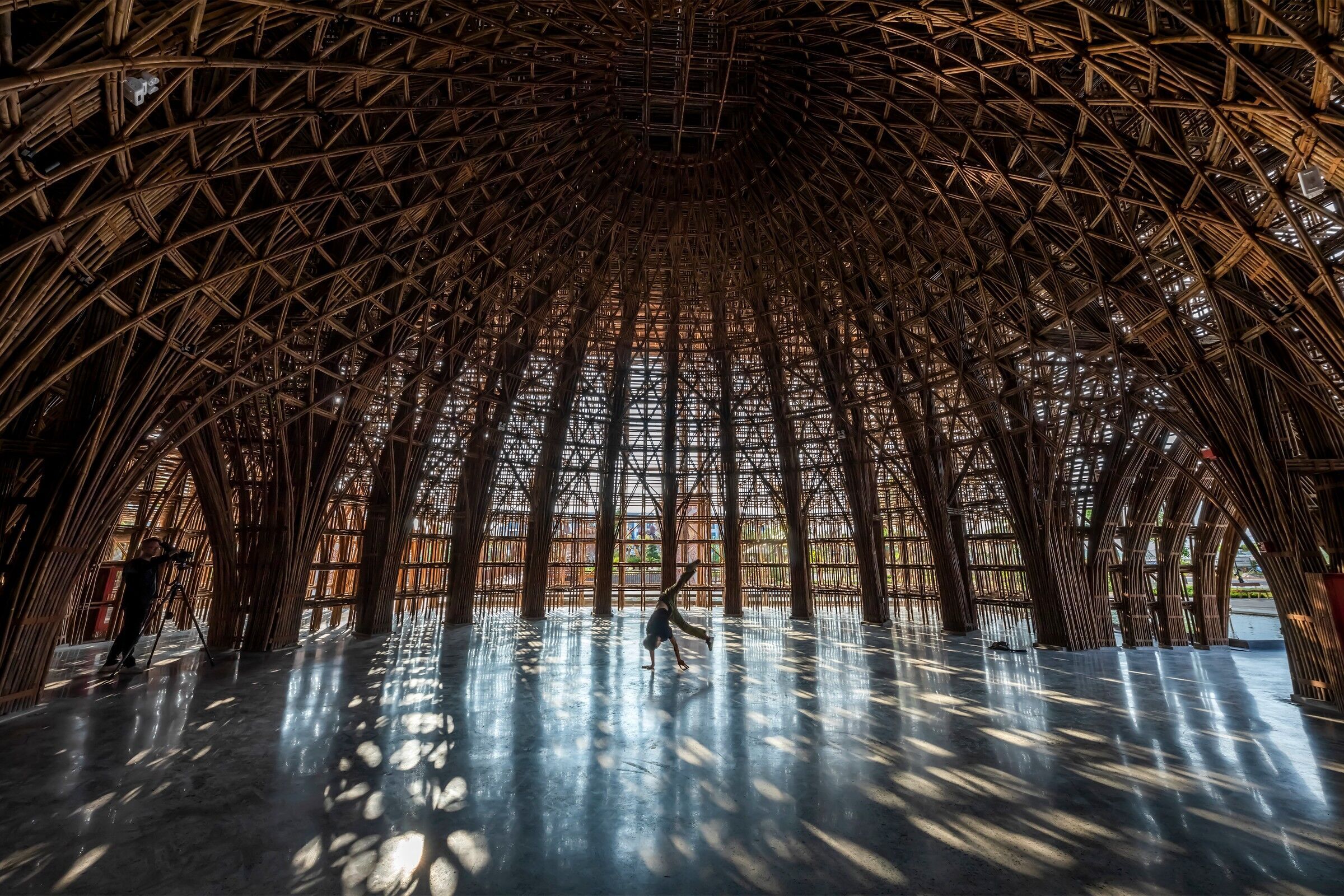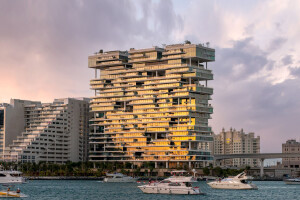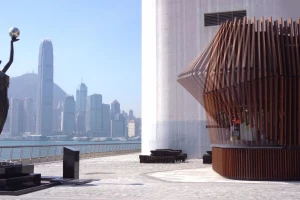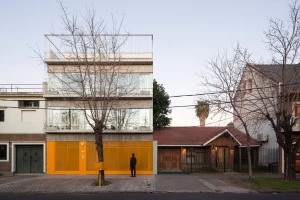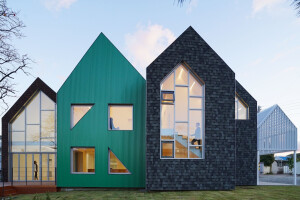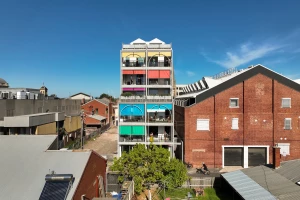Vietnam occupies the eastern edge of Southeastern Asia and boasts a diverse landscape of mountains, tropical forests, coasts, and wetlands. This rich natural environment is reflected in Vietnamese architecture, which embraces indigenous traditions, cultural influences, and modernist designs in harmony with nature. Traditional Vietnamese architecture like pagodas and communal houses (đình), are often set amidst lush landscapes and symbolize a connection between humanity and the natural world. Over centuries, Vietnam displayed a layered architectural history with influences from China, India, and later France during the colonial period.
Contemporary architects in Vietnam today adopt an adaptive practice that endorses local identity while incorporating modern functionality, using sustainable materials like bamboo, wood, and brick. The 25 architecture firms listed below capture the essence of Vietnamese architecture:
1. VTN Architects (Vo Trong Nghia Architects)
Vo Trong Nghia Architects (VTN Architects), founded in 2006, is known for its work in Green Architecture that merges nature, local vernacular, and contemporary design. Using materials like bamboo, perforated blocks, thatched roofs, and weathered stone, VTN incorporates traditional Vietnamese techniques alongside modern methods. Its designs feature lush greenery, cooling water systems, and shaded terraces, emphasizing harmony with nature and energy efficiency. VTN’s motto, "Greening the City," reflects its mission for sustainable, happy urban spaces.
H&P Architects, founded in 2009, emphasizes creating architecture that harmonizes with natural, social, and human elements. Its approach integrates local materials and adaptive methods to suit regional climates while addressing contemporary societal needs. Projects feature versatile designs for cultural, residential, and commercial spaces, in line with HPA’s philosophy that intertwines "Behavior" (architecture’s interaction with nature and society), "Language" (expressing space and culture), and "Mind" (the guiding principle of design coherence).
Tropical Space, founded by Nguyen Hai Long and Tran Thi Ngu Ngon, excels in crafting environment-friendly designs tailored to Vietnam's tropical climate. It prioritizes natural ventilation with porous layouts, enabling buildings to breathe. Rooted in sculptural inspiration, its work features simple forms and locally sourced materials like brick and concrete. The firm’s pragmatic use of rudimentary techniques delivers extraordinary results, reimagining contemporary Vietnamese architecture. By responding to local climate conditions and the personal narratives of clients, Tropical Space creates sustainable, people-centered designs.
MIA Design Studio, founded in 2003 in Ho Chi Minh City, Vietnam, seeks to redefine architecture’s role in environmental and societal transformation. With projects across architecture, landscape, interior, and master planning, the studio, led by Nguyen Hoang Manh, creates human-centric designs that form a deeper connection to the environment. Leveraging local materials and innovative techniques, its projects emphasize resource preservation and sustainable development. The team integrates architecture with landscape and interiors, ensuring holistic and tailored solutions.
MM++ Architects, founded by Pham Thi My An in 2009, emphasizes context-specific designs that embrace tropical conditions and foster connections with nature. The firm prioritizes bespoke designs over ready-made solutions, emphasizing a collaborative creative process. Known for high-quality residential and boutique hospitality projects, it uses locally sourced materials and methods that focus on environmental comfort. Partnering with MIMYA Construction, it delivers comprehensive services, excelling in project management, budgeting, and craftsmanship.
KIENTRUC O, based in Ho Chi Minh City, Vietnam, is led by architects Dam Vu and Anni Le. The firm approaches architecture as a dynamic process of absorption, contemplation, and experience. Its projects reflect a balance of creativity and reality, symbolized by the "O" in its name, representing completeness. Its designs emphasize thoughtful integration of function and form, adapting to diverse types and scales. By exploring innovative methods and materials, KIENTRUC O crafts spaces that resonate with cultural context and contemporary needs.
IDEE Architect, led by Tran Ngoc Linh and Nguyen Huy Hai, embraces simplicity in architectural, interior, and resort design. Prioritizing nature and environmental impact, the firm creates designs that resonate with pure beauty while enhancing human awareness. With projects of varying scales, IDEE has gained recognition since 2010 through award-winning works and international publications.
1+1>2 Architecture, established in 2003 specializes in community-focused projects like schools and houses for ethnic minorities, integrating vernacular wisdom and modern approaches in both rural and urban contexts. Emphasizing “Happiness Architecture,” they aim to foster ecological balance, cultural diversity, and humane living spaces. Its adaptive use of materials—combining bamboo, steel, soil, and concrete—ensures cost-effective, context-responsive solutions. This philosophy extends to training architects with a martial arts-inspired model, building ethical, socially responsible professionals for a sustainable future.
AD+studio is a Vietnam-based architectural firm committed to celebrating Vietnamese cultural identity through its designs. The studio’s approach integrates diverse local contexts and the unique lifestyle habits of users, creating architecture deeply rooted in its surroundings. By using materials and methods that resonate with local traditions, AD+studio crafts vibrant, dynamic structures that reflect the essence of their environment. Rather than focusing on a singular architectural style, the firm draws inspiration from cultural richness and individual stories, resulting in works that are both contextually sensitive and full of vitality.
Founded in 2014, Creative Architects (CTA) is driven by a commitment to innovation and societal impact. The firm explores imaginative solutions through both architectural practice and research, addressing contemporary social challenges. CTA employs a thoughtful approach to materials and construction methods, integrating functionality and creativity to craft engaging architectural spaces. Through continuous learning and collaboration, CTA fosters unique user experiences while promoting architectural evolution.
Founded in 2011 by Japanese architect Joe Chikamori, 07BEACH explores creative freedom in Vietnam. Drawing cultural inspiration, the firm’s designs emphasize unique materials and tailored techniques. In "Ramen in the Video Game World," inexpensive materials like tiles, wood, and cement are abstractly arranged to evoke nostalgic gaming aesthetics. In the "Machiya Townhouse Renovation," modern polyhedron glass walls juxtapose with traditional Kyoto architecture, creating a vibrant dialogue between past and present.
LANDMAK ARCHITECTURE, established in 2008 by architects Ta Tien Vinh and Truong Tuan Chung, focuses on modern design in Vietnam. The firm adopts local building practices while introducing modern concepts, aiming to integrate innovative methods into the architectural landscape. By experimenting with local materials and construction techniques, LANDMAK ARCHITECTURE strives to bridge the gap between contemporary architecture and Vietnam’s traditional building heritage, promoting sustainable and functional spaces that resonate with local culture.
AD9 Architects is a collaborative architectural group founded by a dynamic team including Nguyễn Nhỏ, Đặng Thành Phát, Phan Trọng Hiệp, and others. The firm is rooted in a collective approach, emphasizing innovative designs that reflect Vietnam’s cultural identity and environmental contexts. AD9 Architects utilizes diverse materials and methods to adapt to project-specific needs, prioritizing sustainability, functionality, and a strong connection to the surrounding environment.
Based in Vietnam, H2 Architects embraces local resources to create functional and visually striking designs. Its projects often emphasize sustainability, employing lightweight structures, recycled steel, and natural materials like wood and stone to minimize environmental impact. H2’s designs, such as the Dai An Apartment and AnNam Village, utilize flexible layouts, ventilation, and green spaces to maximize comfort and efficiency.
In Re Studio, established in 2016 and based in Ho Chi Minh City, specializes in creating spaces that resonate with social and environmental contexts. Guided by the firm's design philosophy "in re" (meaning "in relation"), it crafts enduring designs that respect the surroundings. Its approach integrates thoughtful material choices and construction methods, prioritizing sustainability and adaptability.
16. I.HOUSE Architecture and Construction
Founded in 2007, I.HOUSE Architecture and Construction Joint Stock Company focuses on architecture, interior design, and civil construction. Its projects balance creativity with practicality, employing locally sourced and environmentally friendly materials when possible. With over a decade of expertise, the team combines passion, responsibility, and creativity to deliver enduring, high-quality architectural solutions.
Founded in Hanoi in 2015, Nghia-Architect is a dynamic and innovative firm committed to sustainable architectural practices. Combining knowledge from Asia and Europe, the firm integrates traditional Vietnamese elements with contemporary design. Its approach emphasizes environmentally conscious materials and methods, often using local resources to reduce environmental impact.
ROOM+ Design & Build excels in crafting innovative, context-sensitive architecture, harmonizing functional efficiency with environmental responsiveness. Its projects, like The Cornerstone and Dual House, transform challenging sites into optimized spaces through structured planning and versatile designs. Utilizing materials such as polished concrete, reused bricks, glass, and wood, it balances durability and aesthetics. Thoughtful features—triangular balconies, landscaped courtyards, and voids for ventilation and lighting—enhance livability and sustainability. ROOM+ emphasizes flexible, multi-functional spaces and engages users with greenery, fostering vibrant urban living.
MW Archstudio, based in Ho Chi Minh City, Nha Trang, and Hue, Vietnam, prioritizes using recycled and locally sourced materials, minimizing concrete to reduce environmental impact. Its projects feature adaptive ventilation, layered roof systems, and natural energy solutions like rainwater collection. Inspired by Vietnam's rich history, MW Archstudio integrates indigenous elements, creating structures that harmonize with their surroundings. The studio fosters environmental responsibility and community engagement by reimagining traditional forms, such as the "Rường house," and designing open, nature-connected spaces.
HGAA, a Vietnam-based architectural firm established in 2017, emphasizes the use of locally sourced materials, modern construction technologies, and context-sensitive solutions to create environmentally harmonious spaces. HGAA integrates simplicity with creativity, prioritizing functionality, cultural relevance, and aesthetic longevity. Projects reflect a deep respect for nature, enhancing living environments while addressing sustainability through efficient resource use and design adaptability.
21. Nguyen Khai Architects & Associates
Nguyen Khai Architects & Associates is a Vietnam-based firm known for its thoughtful integration local materials such as concrete, glass, and indigenous plants to create sustainable, minimalist spaces that blur the boundaries between indoors and outdoors. Projects like Labri and Nala emphasize environmental harmony, with features like green facades, rooftop gardens, and natural ventilation. By fostering connections to nature and prioritizing functional aesthetics, the firm creates spaces that offer serenity and sustainability. Each project reflects a poetic dialogue between architecture, local culture, and the natural environment.
K59 Atelier, a small architecture atelier, emphasizes a design philosophy rooted in human behavior and living context. Its projects showcase a commitment to sustainability, reuse of materials, and integration with natural surroundings. By retaining traditional elements like terracotta, wood, and brick, and prioritizing existing ecosystems, it creates harmonious spaces that blend old values with modern needs. Through innovative methods—such as adaptive reuse, tree preservation, and sustainable water systems—K59 Atelier crafts architecture that respects local culture and environment.
23o5studio, led by architect Ngô Việt Khánh Duy, is a Vietnam-based practice emphasizing harmony between humans, nature, and self. Rooted in local architectural traditions, its projects integrate materials like natural wood, concrete, and terracotta, fostering simplicity and comfort. The studio's designs explore spatial connections, promoting tranquility through thoughtful material application and sustainable methods.
Pham Huu Son Architects operates in Ho Chi Minh City and Nha Trang, designing projects that embrace Vietnam's temperate climate and distinct seasons. Its approach emphasizes green architecture, integrating lush spaces and natural ventilation to connect buildings with nature. The firm prioritizes sustainable practices, employing climate-friendly materials and methods that minimize environmental impact.
STD Design Consultant, headquartered in Ho Chi Minh City, integrates diverse cultural perspectives with cutting-edge techniques to create innovative, sustainable designs across residential, commercial, and public spaces. Using materials like local stone, sustainable timber, and energy-efficient systems, the firm ensures durability and eco-conscious solutions. Projects like the Tinh An home highlight the use of sustainable materials such as unfinished concrete blocks, reclaimed wood, and natural greenery, fostering an eco-conscious aesthetic.
The '25 best firms' series is curated by the Archello editorial team. The selection is based on a number of factors including the number of shortlisted and winning entries in the Archello Awards, the number of projects a firm has uploaded to its Archello profile, the number of projects that have been featured by Archello, as well as the size and quality of the projects included in each firm's Archello portfolio.

